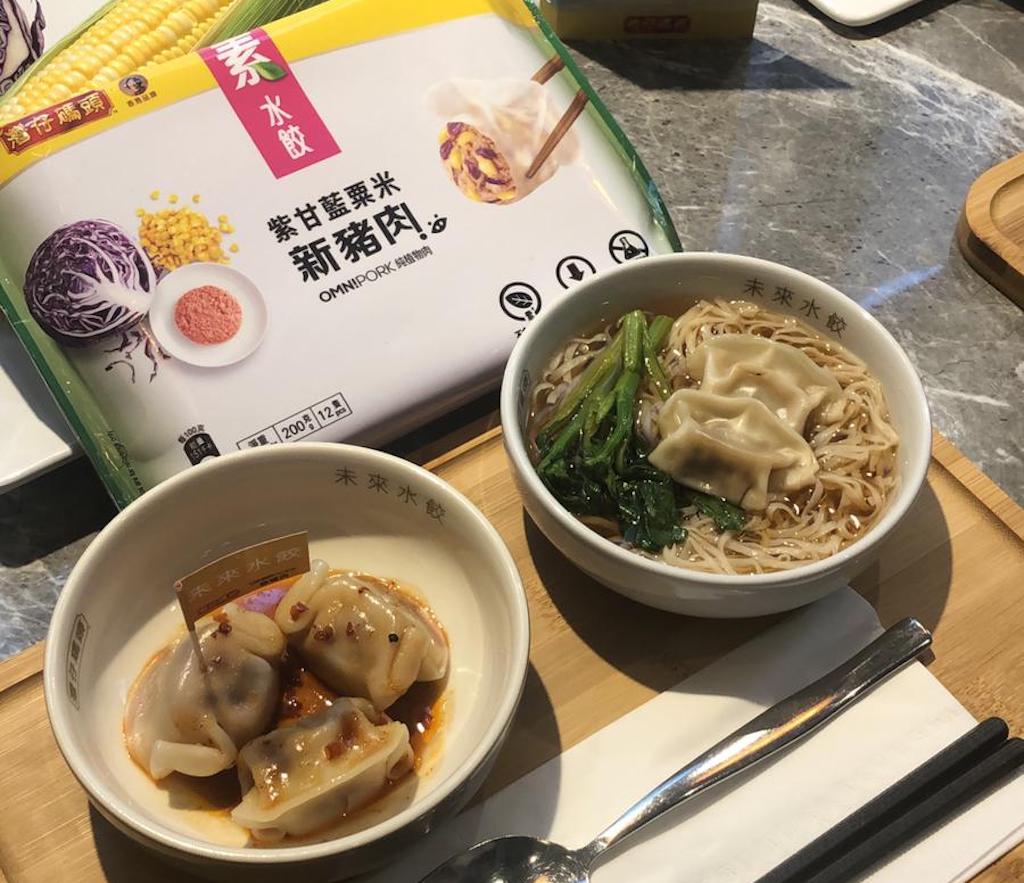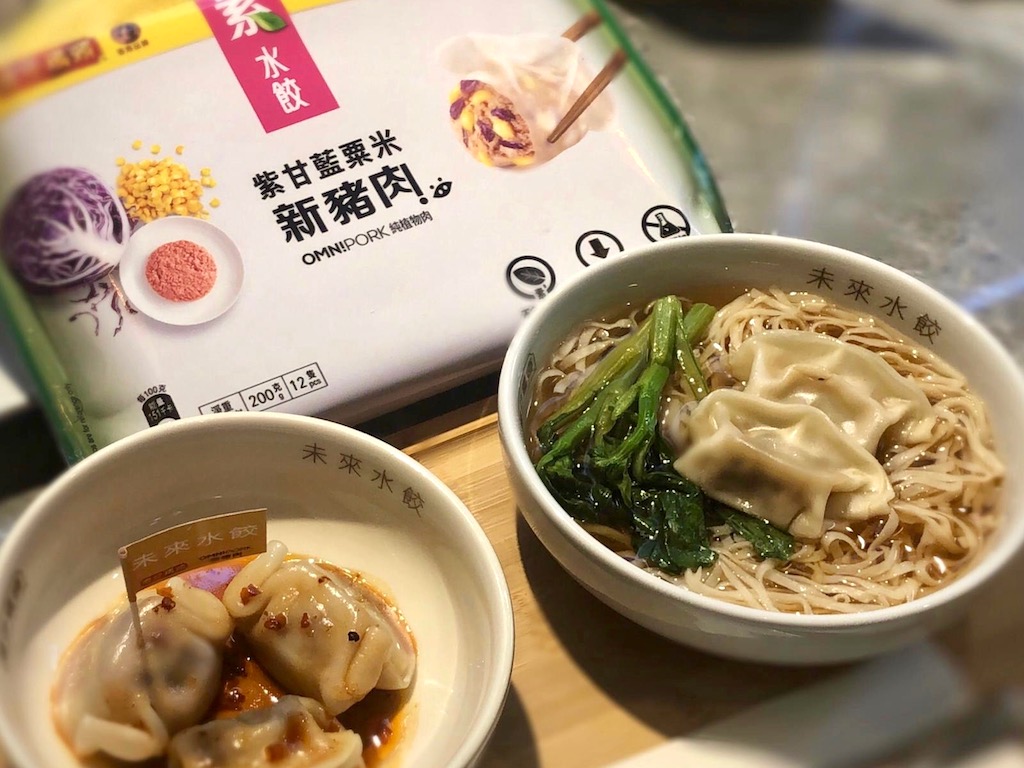6 Mins Read
Dumplings for change: price parity on plant-based version of Asia’s comfort food
Wanchai Ferry, Hong Kong’s leading frozen packaged meal brand famous for its dumplings has just launched two new plant-based dumplings made with Omnipork, the vegan pork mince developed by Green Monday. As one of the most recognisable brands on supermarket shelves across Hong Kong and Asia, the move signals the surging demand for plant-based options amongst mainstream consumers who are now increasingly concerned about health and the environment.
Founded in 1978 by “Dumpling Queen” Kin-wo Chong, Wanchai Ferry is famous for bringing both convenience and high-quality authentic taste to frozen dumpling meals in Hong Kong. Owned by FMCG giant General Mills, Wanchai Ferry’s wontons and dumplings can be found all over the world, from its home city Hong Kong to France and the United States. In China, the brand boasts more than 10% of the market share. For many families across the Asian region, Wanchai Ferry is a comfort food brand that is instantly recognisable.
While Wanchai Ferry already had vegetable-based dumplings, wontons and baos in its product line, the two new vegan-friendly and preservative-free frozen dumpling products – the Black Pepper & Mushroom Omnipork Dumpling and the Purple Cabbage & Corn Omnipork Dumpling – represents the first time a major local frozen food manufacturer has incorporated a “2.0” plant-based meat alternative.
It uses Omnipork, a vegan pork mince analogue developed by Hong Kong-based social enterprise Green Monday’s food tech arm Right Treat, made from peas, non-GMO soy, shiitake mushrooms and rice.
The game-changing meat alternative
Speaking to Green Queen about the launch, Janice Cheng, the commercial director at General Mills said: “We’ve always known that the number of people eating vegan and vegetarian were on the steady rise. But the advent of plant-based meat really changed the landscape.”
In fact, the very first time Cheng herself tasted Omnipork at a Green Monday event last year, she couldn’t even tell the difference between the analogue and conventional pork.
Cheng believes that the plant-based shift is big in Hong Kong, and it’s one to stay. “More consumers are motivated by the health benefits of a plant-based diet, as well as the lesser footprint it would leave on the environment,” she said.

“We wanted to extend our plant-based variety to cater to this growing demand amongst consumers, and this is a product that would make it convenient for the everyday person in Hong Kong to opt for a healthy meal that would make a difference to the planet.”
“Plant-based meats have changed the consumer experience of a meatless dumpling completely, uplifting the taste and texture so much that the mainstream consumer would find it easy to opt for the vegan option,” she added.
Mass affordability for plant-based foods
Both Omnipork dumplings will be retailed at the same price of Wanchai Ferry’s conventional meat dumplings (HK$24.90 / US$3.21 per pack) across over 600 locations at all major supermarkets in Hong Kong in late May, including ParknShop, Wellcome, Aeon and YATA. It will also be served in Green Common eateries.
The significance of this can hardly be overstated. Widely held beliefs associating plant-based diets with a hefty price tag has persisted in Hong Kong over the years.

For a renowned local brand to offer the plant-based pork option for the exact same price as any other dumpling will shatter misconceptions, proving that affordable and accessible plant-based options do exist. The potential for the much-needed change in dietary habits amongst mass audiences is huge, especially given that price remains a greater priority rather than moral considerations for the majority of consumers.
“Wanchai Ferry is a brand that every Hong Konger is familiar with, it is a brand that goes into every household. To have that price parity is so vital to prove that plant-based can be for everyone. It was our goal from day one, to make the economics work,” said David Yeung, founder and CEO of Green Monday.
“There is now a place for every dish – from burgers to hotdogs and dumplings – to be taken over by a plant-based meat alternative,” he added.
Cheng agreed that to push plant-based diets into the mainstream, it had to be affordable. “It’s what will convince people who wouldn’t otherwise change their habits. Providing [Omnipork dumplings] at the same price will make it possible for every single local household,” she said.

Covid-19 is accelerating diet change
The coronavirus crisis has become a big boost in terms of public understanding of the advantages of plant-based protein. From exposing the dangers of working conditions in slaughterhouses to the vulnerability of the meat supply chain and ongoing livestock diseases, the pandemic has heightened consumer awareness of food safety, hygiene and health.
“The coronavirus has clearly made everyone think a lot about food safety and hygiene, but on top of that, more people are also taking the time to reflect about the entire ecosystem, and want to make changes to reduce their environmental impact as the link between the planet and health becomes more clear,” explained Cheng.
Read: 5 signs vegan food tech investment is heating up amidst Covid-19 supply shock
The product itself – frozen dumplings – is also a highly marketable product as more people stay at home for meals instead of dining out. “It would be a good time to launch plant-based frozen dumplings in any circumstance, but with the coronavirus pandemic lingering on for the foreseeable future, it is incredibly relevant to be retailing a convenient, affordable yet fully animal-free item in grocery stores,” said Yeung.
“Future” dumplings, a name that empowers
In Cantonese, the tagline accompanying the new Omnipork range by Wanchai Ferry translates to “future dumplings” – and looking ahead, it’s a promising bet that businesses are ramping up their plant-based strategy in order to stick around for the long run.

“There is a paradigm shift,” remarked Yeung. “No doubt, Wanchai Ferry knows that introducing plant-based products will appeal to younger audiences and generations to come.”
The latest figures of the plant-based industry suggests that Yeung is right. If 2019 was a year of milestones for the vegan sector, 2020 is explosive. Despite severe economic disruption and downturn amidst the unfolding health crisis, vegan meat has been flying off the retail shelves at record-breaking levels, major FMCGs are partnering with food techs and aggressively pursuing the plant-based market.
It looks like we can expect more major plant-based breakthroughs in the near future.
Lead image courtesy of Green Queen.




